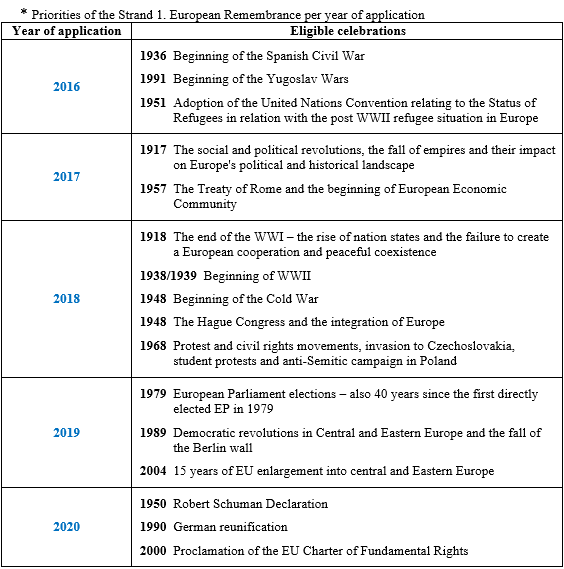On December 18th 2015 the European Commission adopted the Annual Work Programme for the Europe for Citizens Programme 2016, which defines the priorities of the Programme.
It is important to emphasize that from 2016 onwards there will no longer be one-year priorities (several priorities valid for each year), but the
same multiannual priorities for the whole period between 2016 and 2020.
The aim of this change is to give potential beneficiaries more time for planning and preparation of project proposals. The Commission maintains the right to additions and/or addendums of the priorities in case of such need, due to new political circumstances, but this will be done only after the consultations with the representatives of a civil dialogue group and the members of the Programming Board.
The Directorate-General Home and Migration Affairs (DG HOME) has been given the competence for the Europe for Citizens Programme, with respect to the previously authorised Directorate-General Communication (DG COMM). According to this, from now on a special emphasis will be given to the topics of
immigration crisis, in addition to the priorities of the Programme, thus it is advisable to form the project proposals in a manner that they deal with this topic in some part, especially since Croatia is one of the European countries directly involved in accommodation and provision of humanitarian aid to the immigrants.
For the period 2016-2020 the topics have been chosen with the aim of encouraging discussions on important events in both old and recent European history (European remembrance), as well as on social, economic and political topics at the EU level (Democratic engagement and civic participation), as follows:
Strand 1- European remembrance
1.Commemoration of major historical turning points in recent European history
2016-2017-2018-2019-2020*
2. Civil society and civic participation under totalitarian regimes
3. Ostracism and loss of citizenship under totalitarian regimes: drawing the lessons for
today
4. Democratic transition, accession to the European Union and Europeanization
 Strand 2- Democratic engagement and civic participation
Strand 2- Democratic engagement and civic participation
1. Understanding and debating euroscepticism
2. Solidarity in times of crisis
3. Combatting stigmatisation of "immigrants" and building counter narratives to foster
intercultural dialogue and mutual understanding
4. Debate on the future of Europe
News |
Europe for Citizens (EfC)



